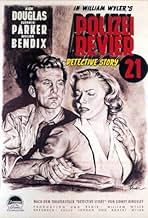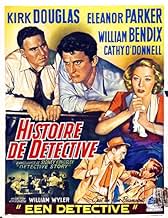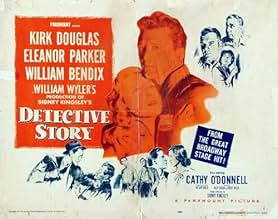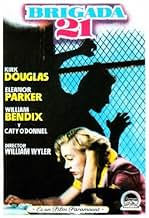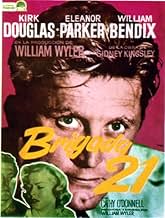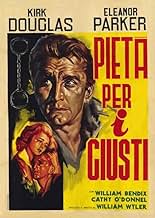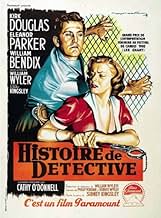CALIFICACIÓN DE IMDb
7.5/10
10 k
TU CALIFICACIÓN
Un día en la sala del escuadrón del Precinto 21, con una variedad de personajes causando problemas al detective Jim McLeod.Un día en la sala del escuadrón del Precinto 21, con una variedad de personajes causando problemas al detective Jim McLeod.Un día en la sala del escuadrón del Precinto 21, con una variedad de personajes causando problemas al detective Jim McLeod.
- Dirección
- Guionistas
- Elenco
- Nominado a 4 premios Óscar
- 7 premios ganados y 11 nominaciones en total
William 'Bill' Phillips
- Det. Pat Callahan
- (as William 'Bill' Phillips)
- Dirección
- Guionistas
- Todo el elenco y el equipo
- Producción, taquilla y más en IMDbPro
Opiniones destacadas
The film is the story of a great detective who didn't know he was trailing his own heartbreak . Brought by William Wyler , Academy Award Winner who gave ¨The best years of our lives¨ and Pulitzer Price Winner Sidney Kingsley , author of ¨Dead end¨ and featuring of the cast that made from the smash Broadway play so sensational about a love with no punches pulled . The picture talks the events at a N.Y.C. police precinct .
Excellent casting with Kirk Douglas as an angry , grumpy and violent police with obsession to imprison a doctor played by George MacReady , Eleanor Parker as the loved wife with a terrible secret , William Bendix as a good , agreeable policeman , Joseph Wiseman as a hysterical thief and Lee Grant who was prized in Cannes festival to the best female interpretation . Cameraman Lee Garmes makes an exceptional cinematography reflecting splendid images in white and black photography plenty of lights and darks , typical of noir cinema . And uncredited John F Seitz who filmed the last three weeks of production . Lee Garmes along with Nicholas Musuruca , John Seitz and John Alton cinematographers are the fundamental artifices of this expressionist cinema or ¨Film Noir¨full of dark and portentous frames . William Wyler direction is magnificent , blending documentary and police critical , he realized this exciting adaptation at a theater until the actors learned the dialog and , after that , he made a quick shooting . The film was nominated for Academy Award Winner to screenplay , Philip Yordan , Robert Wyler , (director's brother) , Eleanor Parker as main actress and Lee Grant as secondary actress . Support cast is frankly excellent such as Horace McMahon, Joseph Wiseman, Michael Strong and Lee Grant , all of them re-enacted their stage roles . Being film debut of Lee Grant and Burt Mushin .
The motion picture was compellingly directed by the great maestro William Wyler . Wyler was considered by his peers as second only to John Ford as a master craftsman of cinema and the winner of three Best Director Academy Awards . Wyler was a great professional who had a career full of successes in all kind of genres as Film Noir : ¨Detective story¨ , ¨The desperate hours¨ , ¨Dead End¨ ; Western : ¨The Westener¨, ¨Friendly persuasion¨ , ¨Big Country¨ , but his speciality were dramas as : ¨Jezebel¨ , ¨The letter¨ , ¨Wuthering Heights¨ , ¨The best years of our lives¨, ¨Mrs Miniver¨, ¨The heiress¨ , ¨the little Foxes¨ , ¨The collector¨ and Comedy as two films starred by Audrey Hepburn : ¨How to steal a million¨ and of course ¨Roman's holiday¨ with Audrey at her Oscar-winning best and immortal comedy-romance. Furthermore , his greatest hit was the Super-Oscarized ¨Ben-Hur¨. ¨Detective story¨resulted to be a great film , nowadays very well considered . Rating : Better than average . Well worth watching .
Excellent casting with Kirk Douglas as an angry , grumpy and violent police with obsession to imprison a doctor played by George MacReady , Eleanor Parker as the loved wife with a terrible secret , William Bendix as a good , agreeable policeman , Joseph Wiseman as a hysterical thief and Lee Grant who was prized in Cannes festival to the best female interpretation . Cameraman Lee Garmes makes an exceptional cinematography reflecting splendid images in white and black photography plenty of lights and darks , typical of noir cinema . And uncredited John F Seitz who filmed the last three weeks of production . Lee Garmes along with Nicholas Musuruca , John Seitz and John Alton cinematographers are the fundamental artifices of this expressionist cinema or ¨Film Noir¨full of dark and portentous frames . William Wyler direction is magnificent , blending documentary and police critical , he realized this exciting adaptation at a theater until the actors learned the dialog and , after that , he made a quick shooting . The film was nominated for Academy Award Winner to screenplay , Philip Yordan , Robert Wyler , (director's brother) , Eleanor Parker as main actress and Lee Grant as secondary actress . Support cast is frankly excellent such as Horace McMahon, Joseph Wiseman, Michael Strong and Lee Grant , all of them re-enacted their stage roles . Being film debut of Lee Grant and Burt Mushin .
The motion picture was compellingly directed by the great maestro William Wyler . Wyler was considered by his peers as second only to John Ford as a master craftsman of cinema and the winner of three Best Director Academy Awards . Wyler was a great professional who had a career full of successes in all kind of genres as Film Noir : ¨Detective story¨ , ¨The desperate hours¨ , ¨Dead End¨ ; Western : ¨The Westener¨, ¨Friendly persuasion¨ , ¨Big Country¨ , but his speciality were dramas as : ¨Jezebel¨ , ¨The letter¨ , ¨Wuthering Heights¨ , ¨The best years of our lives¨, ¨Mrs Miniver¨, ¨The heiress¨ , ¨the little Foxes¨ , ¨The collector¨ and Comedy as two films starred by Audrey Hepburn : ¨How to steal a million¨ and of course ¨Roman's holiday¨ with Audrey at her Oscar-winning best and immortal comedy-romance. Furthermore , his greatest hit was the Super-Oscarized ¨Ben-Hur¨. ¨Detective story¨resulted to be a great film , nowadays very well considered . Rating : Better than average . Well worth watching .
Some films are so full of life they have to be seen again and again. I first saw this one in my early teens and loved it, despite difficulty in understanding it. Decades later I still love it, and always will. It has its flaws: everybody overacts (beautifully), as if on stage. The writing is a bit too well-structured, almost like clockwork, the characters are a bit too symbolic and easy to categorise. The comic relief kicks in just on schedule. The psychological diagnosis is too precise. And yet, this is one of the greatest films ever made. It has a sense of respect for the totality of life, and makes tragedy almost poetic. Fascinating though the plot may be, the essence of this film goes beyond plot. It's a symphony of cacophony. The playwright would have made a fine composer.
A play which tells the story of a day in the lives of the several people who populate a police precinct translates more or less transparently between mediums, though with its theatrical pace results in a vigorous, enthralling drama with a solid, receptive cast. Kirk Douglas, playing the central cop, a brooding maverick who can't stand having to stop at the line between law and vengeance, is very intense in particular, the breadth of view of a crystallizing soul masqueraded by rigor and command, which makes for some delicate scenes with his wife, Eleanor Parker. The very natural William Bendix is one of the other officers in the precinct, a cop with a delicate sensibility, the clear contrast to the uncompromising protagonist. But the film's brightest highlights are the few moments dominated by the brilliant Lee Grant, whose character seems non-sequitary yet has a refreshing outside-world quality. Dense with lively exhibitions of the sort of devil-may-care influx that transits and languishes through a workday of plainclothes detectives, it is a police procedural not in the traditional sense. There is no central case over which our detectives toil. There is simply an allotment of arrests and conflicting views on the confines of police work.
While this Edgar-winning cop drama stays in effect a filmed play, William Wyler uses the innate limitations of such a project as a creative outlet, as well as his widely known grating approach multiple retakes. The cooped up setting is not just a space where all manner of characters eyeball each other and interplay. It complements the lurking gist of the story's thematic elements and overall to the film's dramatic impact. The staging of the individual scenes, which a lot of the time plays on foreground-background relationships, is intensified by Lee Garmes's deep-focus cinematography, a consistent device used by Wyler throughout his body of work no matter how much he diversifies in genre and tone.
The core of Wyler's consistency throughout his tremendous career is his insistence on emotional truth, thus his enraging approach to directing actors, and thus his track record with directing Oscar-nominated and Oscar-winning performances. Wyler's discretion of angle exposes or intimates more character than the last and apprehends the decisive sensibility to give significance to the experience of seeing the film. He didn't coin anything new. He didn't use unprecedented angles or logistically fussy dolly takes. He's discerning from the acknowledged bill of fare of long shot, medium shot and close-up as the atmosphere of the scene calls for.
While this Edgar-winning cop drama stays in effect a filmed play, William Wyler uses the innate limitations of such a project as a creative outlet, as well as his widely known grating approach multiple retakes. The cooped up setting is not just a space where all manner of characters eyeball each other and interplay. It complements the lurking gist of the story's thematic elements and overall to the film's dramatic impact. The staging of the individual scenes, which a lot of the time plays on foreground-background relationships, is intensified by Lee Garmes's deep-focus cinematography, a consistent device used by Wyler throughout his body of work no matter how much he diversifies in genre and tone.
The core of Wyler's consistency throughout his tremendous career is his insistence on emotional truth, thus his enraging approach to directing actors, and thus his track record with directing Oscar-nominated and Oscar-winning performances. Wyler's discretion of angle exposes or intimates more character than the last and apprehends the decisive sensibility to give significance to the experience of seeing the film. He didn't coin anything new. He didn't use unprecedented angles or logistically fussy dolly takes. He's discerning from the acknowledged bill of fare of long shot, medium shot and close-up as the atmosphere of the scene calls for.
Adapted from a stage play by Sidney Kingsley, "Detective Story" depicts a day at a New York police precinct in the early 1950's. The film resembles a feature-length episode of "Barney Miller" without the jokes as the detectives bring various shoplifters, petty thieves, and embezzlers into the station for booking. However, the film does not lack humor as a broad hammy performance by Joseph Wiseman and an only slightly subtler take on a Brooklynese shoplifter by Lee Grant lighten up the often heavily dramatic proceedings.
The central character, Detective Jim McLeod, is an unforgiving, by-the-book veteran, who sees the world in black and white, good versus evil, with no shades of gray in between. Kirk Douglas brings McLeod to life in one of his finest, most powerful performances. Douglas's Oscar-caliber work is matched by a fragile, deeply felt performance by Eleanor Parker as McLeod's wife, who harbors a secret from her past that, unknown to either McLeod or his wife, connects back to an on-going police case. The scenes between Douglas and Parker are among the best in the film.
Veteran director William Wyler retains most of the play's action in the central precinct room and only occasionally breaks from the claustrophobic set for a breather. Lee Garmes photographed "Detective Story" in crisp black and white, and some of the shots of New York City could be framed and hung on a wall. With a cast of top character players that includes Gladys George, William Bendix, Frank Faylen, and George Macready, the multi-character, multi-plotted "Detective Story" is a powerful, well-acted film that somehow is less often seen than its quality warrants.
The central character, Detective Jim McLeod, is an unforgiving, by-the-book veteran, who sees the world in black and white, good versus evil, with no shades of gray in between. Kirk Douglas brings McLeod to life in one of his finest, most powerful performances. Douglas's Oscar-caliber work is matched by a fragile, deeply felt performance by Eleanor Parker as McLeod's wife, who harbors a secret from her past that, unknown to either McLeod or his wife, connects back to an on-going police case. The scenes between Douglas and Parker are among the best in the film.
Veteran director William Wyler retains most of the play's action in the central precinct room and only occasionally breaks from the claustrophobic set for a breather. Lee Garmes photographed "Detective Story" in crisp black and white, and some of the shots of New York City could be framed and hung on a wall. With a cast of top character players that includes Gladys George, William Bendix, Frank Faylen, and George Macready, the multi-character, multi-plotted "Detective Story" is a powerful, well-acted film that somehow is less often seen than its quality warrants.
An assortment of detectives and an assortment of criminals, all gathered together under the oppressive 21st Precint roof. It's a day that nobody present will ever forget - for better or worse...
Directed by William Wyler (Best years Of Our Lives, Ben-Hur & Wuthering Heights) and starring Kirk Douglas, Eleanor Parker, William Bendix, Cathy O'Donnell and Joseph Wiseman.
Detective Story is based on the smash hit Broadway play by Sidney Kingsley, adapted by Phillip Yordan and Robert Wyler, it's with much relief to me that the worry of it being a stagy production never actually materialises. Practically set on one bleak, but quite excellently appropriate set (creation courtesy of Hal Pereira & Earl Hedrick), Detective Story manages to rise above the very simple plot by boasting interesting characters in a pot boiling story just waiting to reach its peak. Each character has much to offer the film, be it oddly quirky or overtly intense, within the confines of this particular precinct, the characters create engrossing drama.
It's a difficult film to sell without giving too much away, by outlaying the character persona's and mental fortitude's, I personally feel that it will dull the impact of this influential crime genre piece. It's got real raw emotive acting, particularly from Kirk Douglas as Jim McLeod and Eleanor Parker as his wife Mary, while the technical aspects (watch Lee Garmes' camera glide like a third party witness) are impressively high. And with it embracing as it does, morality themes, it also doesn't lack for interest to the cranial head scratching crowd.
It's by definition to me an all encompassing picture, one that is now sure to be a perennial viewing in my home. It's not a standard crime picture, and it most definitely is a talky film, but this works incredibly well, so one can only hope that many others will feel the same as myself, in that namely that it is indeed a fine and essential genre piece. 8/10
Directed by William Wyler (Best years Of Our Lives, Ben-Hur & Wuthering Heights) and starring Kirk Douglas, Eleanor Parker, William Bendix, Cathy O'Donnell and Joseph Wiseman.
Detective Story is based on the smash hit Broadway play by Sidney Kingsley, adapted by Phillip Yordan and Robert Wyler, it's with much relief to me that the worry of it being a stagy production never actually materialises. Practically set on one bleak, but quite excellently appropriate set (creation courtesy of Hal Pereira & Earl Hedrick), Detective Story manages to rise above the very simple plot by boasting interesting characters in a pot boiling story just waiting to reach its peak. Each character has much to offer the film, be it oddly quirky or overtly intense, within the confines of this particular precinct, the characters create engrossing drama.
It's a difficult film to sell without giving too much away, by outlaying the character persona's and mental fortitude's, I personally feel that it will dull the impact of this influential crime genre piece. It's got real raw emotive acting, particularly from Kirk Douglas as Jim McLeod and Eleanor Parker as his wife Mary, while the technical aspects (watch Lee Garmes' camera glide like a third party witness) are impressively high. And with it embracing as it does, morality themes, it also doesn't lack for interest to the cranial head scratching crowd.
It's by definition to me an all encompassing picture, one that is now sure to be a perennial viewing in my home. It's not a standard crime picture, and it most definitely is a talky film, but this works incredibly well, so one can only hope that many others will feel the same as myself, in that namely that it is indeed a fine and essential genre piece. 8/10
¿Sabías que…?
- ErroresIn some of the close-up shots of McLeod and Schneider in the back of the paddy wagon, McLeod's shadow can be faintly seen on the rear-projection screen showing the street behind them. (Other shadows can also be seen.)
- Citas
Detective James McLeod: I built my whole life on hating my father. All the time he was inside me, laughing.
- ConexionesFeatured in Paramount Presents (1974)
Selecciones populares
Inicia sesión para calificar y agrega a la lista de videos para obtener recomendaciones personalizadas
- How long is Detective Story?Con tecnología de Alexa
Detalles
- Fecha de lanzamiento
- País de origen
- Idioma
- También se conoce como
- Detective Story
- Locaciones de filmación
- Productora
- Ver más créditos de la compañía en IMDbPro
- Tiempo de ejecución1 hora 43 minutos
- Color
- Relación de aspecto
- 1.37 : 1
Contribuir a esta página
Sugiere una edición o agrega el contenido que falta

Principales brechas de datos
By what name was La antesala del infierno (1951) officially released in India in English?
Responda

